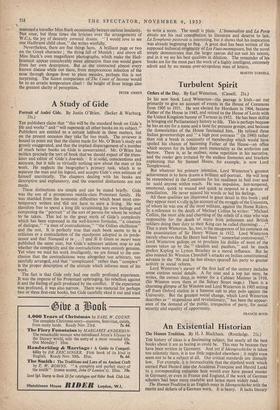A Study of Gide
THE publishers claim that "this will be the standard book on Gide's life and works" and "will supersede all other books on its subject." Publishers are entitled to a certain latitude in these matters, but on the present occasion they take far too much. The reviewer is bound to point out that the claims made for Mr. O'Brien's study are grossly exaggerated, and that the implied disparagement of a number of much better books on Gide is unwarranted. Mr. O'Brien has written precisely the sort of book that we should expect of the trans- lator and editor of Gide's Journals. It is solid, conscientious and accurate, but it tells us virtually nothing new about the man or his Work. He neglects the biographer's primary task, which is to separate the man and his legend, and accepts Gide 's own estimate of himself uncritically. The chapters dealing with his books are descriptive and explanatory, and the essential distinctions are not. made.
These distinctions are simple and can be stated briefly. Gide was the son of a prosperous middle-class Protestant family. He was shielded from the economic difficulties which beset most con- temporary writers and -did not have to earn a living. He was therefore free to spend a long life scrutinising his own feelings and composing the "portrait" of the sort of person for whom he wished to be taken. This led to the great myth of Gide's complexity which has been expressed in the well-known formulas, "a creature of dialogue," "a man of contradictions," "the Gidian otcillation" and the rest. It is perfectly true that each book seems to be a criticism or a contradiction of the standpoint adopted in its prede- cessor and that Numquid et to . . .? and Si le Grain ne meurt were published the same year, but Gide 's admirers seldom stop to ask whether the complexity and the contradictions were entirely genuine. Yet when we read his work intelligently, we are forced to the con- clusion that the contradictions were altogether too arbitrary, too carefully arranged, and that "complicated" rather than "complex" is the proper description of the attitude which informs most of his work.
The fact is that Gide only had one really profound experience. It was the impress of his Protestant upbringing, his rebellion against it and the feeling of guilt produced by the conflict. If the experience was profound, it was also narrow. There was material for perhaps two or three first-rate books, but Gide carefully eked it out and tried to write a score. The result is plain. L'Immoraliste and La Porte etroite are his real contribution to literature and deserve to last. La Symphonie pastorale is interesting, but it shows that his inspiration was already beginning to flag. A great deal has been written of the supposed technical originality of Les Faux-monnayeurs, but the novel simply demonstrates that the larger canvas did not suit his talents, and in it we see his best qualities in dilution. The remainder of his books are for the most part the work of a highly intelligent, extremely adroit and by no means over-scrupulous man of letters.
MARTIN TURNELL


































 Previous page
Previous page